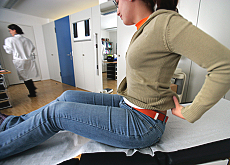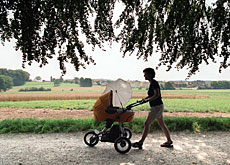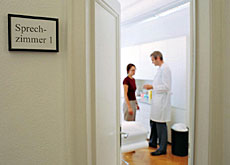Low Swiss abortion rate runs counter to norm

Switzerland's abortion rate is one of the lowest in Europe, according to the latest statistics on terminations in the country.
The Swiss abortion law was relaxed in 2002. Until then it had been one of the most restrictive on the continent.
According to the Federal Statistics Office, there were 10,500 abortions in Switzerland in 2006. This is equivalent to 6.8 terminations per 1,000 women aged 15-44.
This is below the rate of neighbouring countries Germany (7.2), Italy (9.1) and France (14.5), said the Statistics Office.
Christoph Junker, who heads the epidemiology section, said it was not known exactly why Switzerland had such low figures.
“Switzerland is a very well-developed country with a very good medical system and people are normally wealthy and maybe that contributes to low rates of abortion,” he told swissinfo.
Heading the European statistics were Sweden (17.2) and England/Wales (17), according to the statement on Monday. Britain is currently marking 40 years since the Abortion Act was passed in the country.
In Switzerland abortion was legalised in 2002 for the first 12 weeks of pregnancy, bringing it into line with most other European countries.
Before that terminations were prohibited except in cases where a woman’s health was in danger. However, this law was interpreted differently across the cantons with the Catholic, more conservative areas traditionally adopting a stricter stance.
Cantonal differences
The latest figures show there are still some cantonal differences. Cantons with university hospitals or country borders tend to have higher rates.
Geneva had the highest rate in 2006 at 16 per 1,000 women. Smaller, more rural cantons, such as Uri (1.7) and Nidwalden (1.8) had the lowest.
The Statistics Office says the higher rates in some cantons are most likely due to women coming over the border or from other cantons for terminations.
“We have more medical and gynaecological services in the cities so people from the countryside would go to big cities to have an abortion,” said Junker.
More than half of women having abortions in Switzerland were resident foreigners. This showed a need for more prevention measures targeted at this group, said statisticians.
Overall, the number of abortions in Switzerland has dropped since 2002. But the authorities remain cautious over predicting a downward trend, saying it may also be a statistical fluctuation.
No surprise
Beat Fux, a sociologist at Zurich University specialising in family issues, said he was not surprised by the latest statistics.
“Switzerland belongs to those countries where contraception practice is traditionally quite highly developed and the number of undesired pregnancies rather low,” he told swissinfo.
The use and availability of contraception means that the number of unwanted pregnancies among teenagers in Switzerland is reduced, said Fux.
According to the 2006 statistics, the abortion rate among those aged 15-19 was less than six per 1,000, and among those under 16, under one.
Stigma
One issue that remains is the taboo nature of abortion, said Fux. Before 2002, everybody knew that it was possible to have a termination, even if the law was strict, he said.
The practice was more accepted in the more modernised regions than the Catholic or more rural areas, he added, and this may still influence attitudes today.
“If you look at the cantonal data, you have certain cantons with very low rates of around one – I can’t believe that it’s really so small,” said Fux.
“People are going over the cantonal border for the operation. They cannot talk with other people about it and are in a difficult situation because the social control is really rigid. This is an additional problem,” he said.
swissinfo, Isobel Leybold-Johnson
Abortion rate in Switzerland (2006): 6.8 per 1,000 women or 143 per 1,000 births
Cantonal rate: 1.7 to 16 per 1,000 women
7% of women officially cross cantonal borders for a termination
4% come from abroad
The old law from 1937 – one of the oldest in Europe – prohibited abortions except where the woman’s health was in danger. Three previous attempts to change the law in the 1970s and 1980s were rejected by voters. Abortion was legalised in 2002.
Prior to 2002 abortion practices developed differently across the cantons, with some opting for broader interpretations encompassing threat to mental health or socio-economic welfare.
According to the UN, until the 1970s abortion practices in some areas of Switzerland were among the most liberal in Western Europe and women often came from other countries for terminations.
There are no central statistics on the reasons why women opt for abortions in Switzerland.

In compliance with the JTI standards
More: SWI swissinfo.ch certified by the Journalism Trust Initiative



You can find an overview of ongoing debates with our journalists here. Please join us!
If you want to start a conversation about a topic raised in this article or want to report factual errors, email us at english@swissinfo.ch.